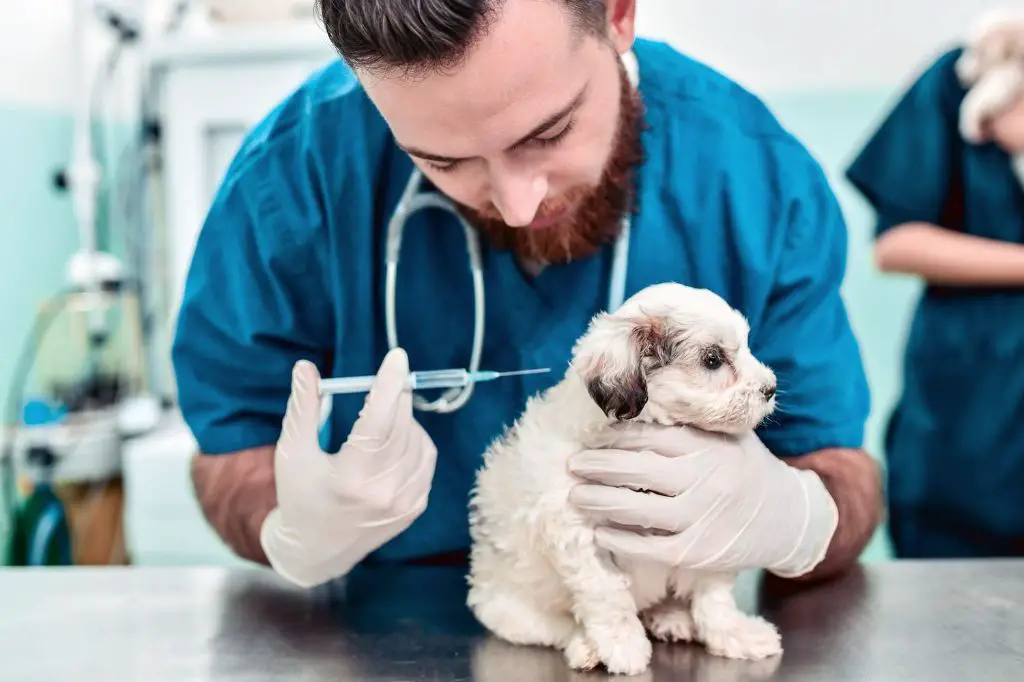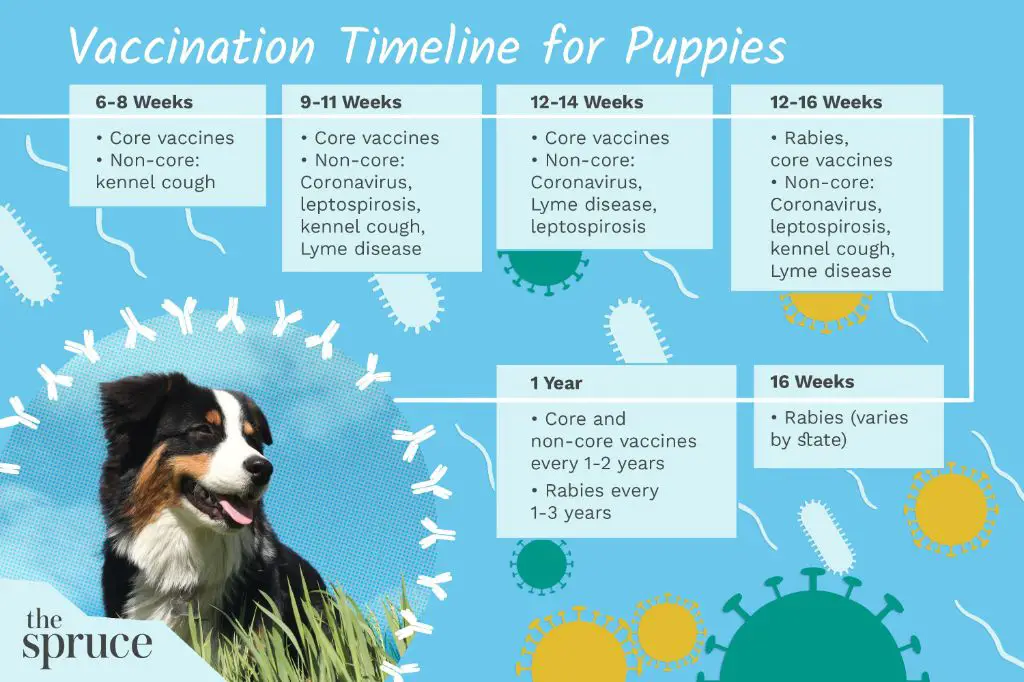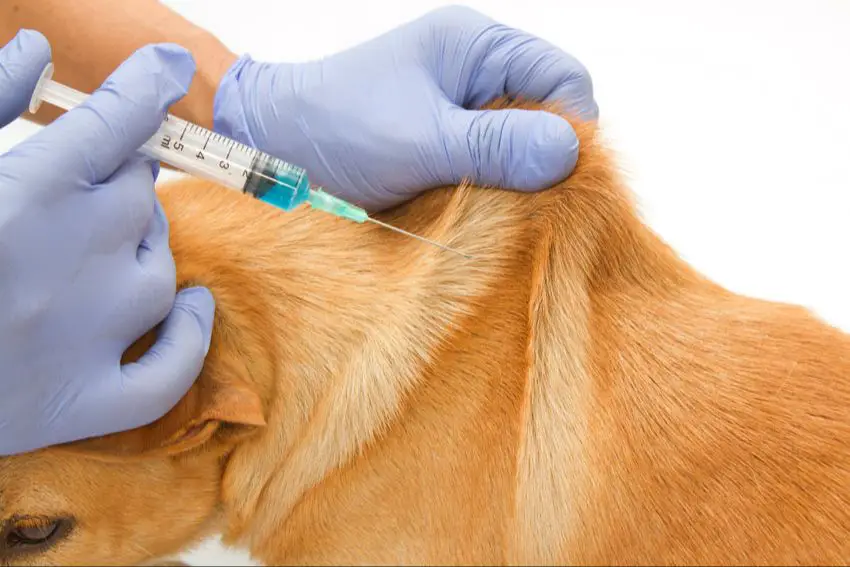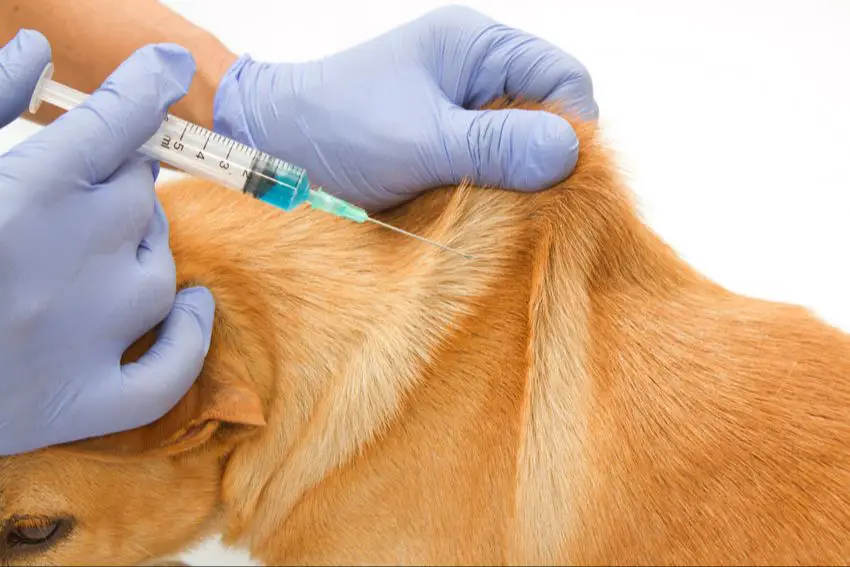Introduction
Of the estimated 77 million pet dogs in the United States, most are routinely vaccinated for common diseases like rabies, distemper, and parvovirus. However, nearly 40% of American dog owners today believe vaccines for their pet can be dangerous or unnecessary – exhibiting what veterinarians call “canine vaccine hesitancy”.
Background on Dog Vaccines
Dog vaccines are divided into two categories: core and noncore vaccines. The American Animal Hospital Association recommends that all dogs receive the following core vaccines (American Animal Hospital Association, https://www.medicaldistrictvet.com/blog/the-why-behind-common-dog-vaccines/):

- Distemper
- Adenovirus-2 (Hepatitis)
- Parvovirus
- Rabies
These core vaccines protect against deadly and highly contagious diseases that are widespread. Distemper, adenovirus, and parvovirus are included together in a combination vaccine often referred to as “DA2PP” or similar names. Rabies vaccination is required by law in most jurisdictions.
Noncore vaccines are those that are given depending on a dog’s individual risk of exposure (American Animal Hospital Association, https://www.splootvets.com/post/the-ultimate-pet-parents-guide-to-dog-vaccines). Common noncore vaccines include:
- Lyme
- Leptospirosis
- Bordetella
- Canine influenza
These help protect against regional diseases like Lyme and Leptospirosis, or diseases like kennel cough that the dog is only at risk of catching in certain situations. Veterinarians recommend noncore vaccines based on the dog’s local disease risks and lifestyle.
Importance of Vaccination
Getting your dog vaccinated is crucial to preventing serious and potentially fatal diseases. According to Hillcrest Animal Hospital, “Vaccines help create immunity to diseases that can kill our pets. Some of these diseases, like distemper, are very common, so vaccination is the best way to ensure your dog stays healthy.” (Source)
Vaccinating your dog also helps maintain herd immunity in the canine population. As Sydney Animal Hospitals explains, “Vaccination is an essential part of the creation of ‘herd immunity’ whereby the larger animal population is protected because the prevalence of many life threatening diseases is kept to an absolute minimum.” (Source) When enough dogs are vaccinated, it makes it harder for diseases to spread between unvaccinated dogs.
Potential Vaccine Risks
Most dogs tolerate their vaccinations without any issues. However, some dogs may experience mild side effects such as a low-grade fever, decreased appetite, and mild lethargy that lasts for a day or two after receiving the vaccine. According to the ASPCA, these reactions are normal and show that your dog’s immune system is responding to the vaccine (source).
Very rarely, dogs may have a severe allergic reaction to a vaccine known as anaphylaxis. Symptoms of anaphylaxis include facial swelling, hives, vomiting, diarrhea, difficulty breathing, pale gums, or collapse. Anaphylaxis usually occurs within minutes after vaccination. Thankfully, severe allergic reactions are extremely uncommon, occurring in less than 1 in 10,000 vaccines administered (source).
Evaluating Vaccine Safety
Vaccines go through extensive testing and must meet strict safety standards set by organizations like the United States Department of Agriculture (USDA) before being approved for use in dogs. According to the USDA, “vaccine development is a long, complex process, often lasting 10 years or more and involving a combination of public and private involvement.”

The vaccine approval process includes:
- Laboratory tests for safety, purity and potency
- Trials in dogs to evaluate the protective effect and safety
- Additional large-scale trials by veterinarians in clinical settings
The USDA’s Center for Veterinary Biologics oversees each step and only grants a license once the vaccine demonstrates efficacy and safety (1). Even after approval, the USDA continues to monitor adverse events associated with licensed vaccines through its voluntary reporting system (2). While side effects can occur, reported rates are very low. One study found that out of over 1.2 million vaccine doses given to dogs, only 238 adverse reactions were reported – a rate of 0.019% (3).
Veterinarians and pet owners play a critical role in ongoing safety monitoring by reporting any concerning reactions or trends. However, the extensive required testing indicates that approved vaccines have undergone rigorous evaluation and meet strict safety standards.
Sources:
(1) https://www.ksvdl.org/laboratories/rabies-laboratory/dog-cat-vaccines-titer-testing.html
(2) https://vcahospitals.com/know-your-pet/vaccines-for-dogs
(3) https://peterdobias.com/blogs/blog/11017397-unsure-about-the-vaccination-safety
Best Practices for Vaccination
Following your veterinarian’s recommended vaccination schedule is crucial to protecting your dog against dangerous diseases. Core vaccines like rabies, distemper, parvovirus, and adenovirus should be administered on the timeline advised by your vet, as staying up to date provides continuous immunity.
Only use vaccines that come from reputable pharmaceutical companies and are administered by a licensed veterinarian. Avoid over-the-counter or dubious vaccines, as their safety and efficacy cannot be verified. According to the American Veterinary Medical Association (AVMA), dog owners should only purchase vaccines that have been approved by the USDA and authorized by a veterinarian for use in that specific animal.
Some key best practices include:
- Starting puppy vaccination series at 6-8 weeks of age
- Administering boosters every 2-4 weeks until 16 weeks old
- Getting annual booster shots as an adult dog
- Only using vaccines prescribed by your vet
- Storing and administering vaccines properly
- Watching your dog for potential reactions after vaccination
By sticking to scientifically-backed vaccination guidelines, pet owners can protect their dogs and communities from preventable contagious diseases.
Signs of a Reaction

After getting vaccinated, most dogs experience no side effects. However, some dogs may have mild or more severe reactions. Here are some symptoms to watch for after your dog receives a vaccine:
-
Mild lethargy – Your dog may act tired or less energetic than usual for a day or two.
-
Decreased appetite – Your dog may not be as interested in food for a short time.
-
Mild fever – A slightly elevated body temperature is not uncommon after vaccination.
-
Local swelling or lumps – You may notice a firm, rounded swelling at the vaccination site that resolves within a week or two.
-
Vomiting or diarrhea – Some dogs experience mild gastrointestinal upset after vaccination.
-
Pain or swelling around the injection site – Some swelling, redness, and pain is normal initially, but notify your vet if it persists or worsens.
-
Facial swelling – Swelling of the face, lips, eyes, or neck might indicate a rare allergic reaction.
-
Hives – The development of hives or rash following vaccination warrants an immediate call to the vet.
-
Severe vomiting or diarrhea – Excessive vomiting or bloody/watery diarrhea are signs of potentially serious reactions.
-
Respiratory signs – Coughing, wheezing, or difficulty breathing after vaccination require prompt veterinary attention.
-
Collapse – Weakness and sudden collapse could signal an emergency situation like anaphylaxis.
Contact your vet right away if your dog experiences any concerning symptoms after receiving a vaccine. Most reactions are mild, but some can be serious and require immediate treatment.
Managing Risk
There are some steps you can take to reduce the chances of your dog having an adverse reaction to a vaccine:

Space out vaccines over multiple vet visits rather than getting everything at once. This gives your dog’s immune system more time to adjust (Nolana Veterinary Clinic).
Ask your vet to administer a single vaccine at a time instead of combination shots. This isolates any potential reactions to one antigen (Family Veterinary Clinic).
Only vaccinate for diseases that are common risks in your area or those your dog is frequently exposed to through lifestyle factors like boarding, hiking, or dog parks.
If your dog has had a prior reaction, pre-treat with Benadryl before the next round of vaccines as recommended by your vet.
Should your dog have a reaction, contact your vet immediately. They may prescribe antihistamines, steroids, or epinephrine depending on the severity. Your vet can also provide guidance on signs to monitor at home and when to bring your dog in.
Schedule a recheck exam within 3-5 days of vaccination to ensure your dog is still healthy after receiving their shots.
The Verdict
While no medical treatment, including vaccinations, is 100% risk free, the general consensus is that core vaccines are crucial for preventing dangerous and potentially fatal diseases in dogs. According to the American Animal Hospital Association (AAHA), vaccines help pets live longer, healthier lives by protecting them from common diseases like distemper, parvovirus, and rabies that used to kill thousands before the development of vaccines (AAHA).
The risks of a dog having a serious adverse reaction to a vaccine are extremely low. In a study examining over 1.2 million dogs vaccinated at 360 veterinary hospitals, less than 1% had any reaction at all to vaccination, and only 0.003% had a serious reaction (Time). This means the chances of a dog having a life-threatening reaction are less than 1 in 100,000.
While no vaccine or medication can ever be guaranteed 100% safe, the general consensus among veterinary professionals and experts is that the benefits of core vaccines far outweigh the minimal risks. Vaccinating dogs is critical for protecting both individual and public health by preventing the spread of contagious and deadly diseases.
Conclusion
In summary, vaccinating dogs is crucial for protecting their health and preventing the spread of contagious diseases. While no medical treatment is 100% risk-free, the potential dangers of vaccines are minimal compared to the benefits. Most dogs experience no side effects from vaccination and go on to live long, healthy lives thanks to this routine preventative care. When weighing whether to vaccinate your dog, remember that the small risks associated with vaccines are greatly outweighed by their ability to prevent suffering from serious and potentially fatal illnesses. Work closely with your veterinarian to make sure your dog receives their recommended vaccinations on schedule to keep them, and the pet population at large, safe and healthy.
Though no complex medical decision comes without some controversy and debate, the evidence strongly supports following standard vaccine guidelines for dogs. With proper veterinary oversight, vaccination remains the most effective and reliable way to increase the chances your dog lives a full, disease-free life. The profound benefits of vaccination greatly outweigh the minimal risks for the vast majority of canine patients. By protecting your dog with vaccines and bringing them in for regular veterinary check-ups, you can have peace of mind knowing you are doing everything possible to keep them healthy and give them the best quality of life.